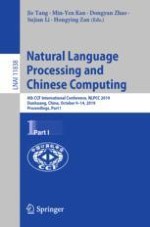2019 | OriginalPaper | Buchkapitel
Neural Melody Composition from Lyrics
verfasst von : Hangbo Bao, Shaohan Huang, Furu Wei, Lei Cui, Yu Wu, Chuanqi Tan, Songhao Piao, Ming Zhou
Erschienen in: Natural Language Processing and Chinese Computing
Aktivieren Sie unsere intelligente Suche, um passende Fachinhalte oder Patente zu finden.
Wählen Sie Textabschnitte aus um mit Künstlicher Intelligenz passenden Patente zu finden. powered by
Markieren Sie Textabschnitte, um KI-gestützt weitere passende Inhalte zu finden. powered by
